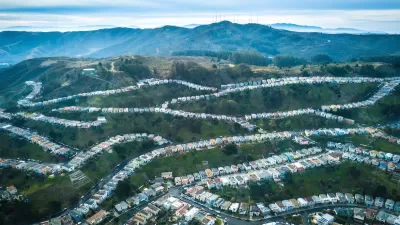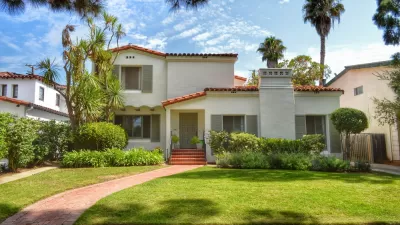Zoning isn’t just a tool of self interest, according to a recent polemic by USC planning professor Lisa Schweitzer.
Lisa Schweitzer, an urban planning professor at the University of Southern California, recently penned an editorial that argues a communitarian case for zoning that counters some of the prevailing wisdom of supply-side arguments favored by liberals and libertarians alike.
Schweitzer's post was inspired by another post by one her former students, and former Planetizen blogger Shane Phillips, which editorialized the recent housing and planning controversies in Palo Alto, California. Schweitzer's purpose is actually to argue against some of the assumptions that connect anti-growth sentiment to the self-interest of property owners.
There are multiple reasons why I think planners and market liberals like Phillips need to back off a little bit on assuming anti-growth sentiment stems from mere homeowner self-interest. I don’t buy that it’s an “evil Baby Boomers versus Wonderful, Urbanity-Loving Millenials [sic]” conflict either, as gratifying as it is for this here Gen-Xer to watch those groups blame each other. American suburbanization started long before the Boomers showed up. Nor am I convinced that homeowners necessarily just have one interest, financial, in zoning. Given that I am likely to get raked over the coals for this post, I want to repeat: the Homevoter Hypothesis is important to understanding urban politics and development. But it’s partial. That’s my argument.
For a more complete understanding of urban politics and development, Schweitzer examines the concept of exclusion:
If you look at ‘exclusion’ as a big, social and political phenomenon instead of just in terms of local zoning and development spats, the arguments for exclusion combine both communitarian concerns about identity and stability and self-determination with economic concerns.
That's a much more sympathetic viewpoint on the concept of exclusion that many urbanists are willing to allow. "Thus communitarians’ arguments for exclusion occur at just about every level of political community, and those communitarian arguments probably deserve more attention than they get in discussions over zoning," adds Schweitzer.
The article is a highly recommended read for anyone willing to put aside assumptions and continue to push the conversation to higher levels of understanding.
FULL STORY: The communitarian case for zoning that planners do not talk about

Depopulation Patterns Get Weird
A recent ranking of “declining” cities heavily features some of the most expensive cities in the country — including New York City and a half-dozen in the San Francisco Bay Area.

California Exodus: Population Drops Below 39 Million
Never mind the 40 million that demographers predicted the Golden State would reach by 2018. The state's population dipped below 39 million to 38.965 million last July, according to Census data released in March, the lowest since 2015.

Chicago to Turn High-Rise Offices into Housing
Four commercial buildings in the Chicago Loop have been approved for redevelopment into housing in a bid to revitalize the city’s downtown post-pandemic.

New Park Opens in the Santa Clarita Valley
The City of Santa Clarita just celebrated the grand opening of its 38th park, the 10.5-acre Skyline Ranch Park.

U.S. Supreme Court: California's Impact Fees May Violate Takings Clause
A California property owner took El Dorado County to state court after paying a traffic impact fee he felt was exorbitant. He lost in trial court, appellate court, and the California Supreme Court denied review. Then the U.S. Supreme Court acted.

How Urban Form Impacts Housing Affordability
The way we design cities affects housing costs differently than you might think.
City of Costa Mesa
Licking County
Barrett Planning Group LLC
HUD's Office of Policy Development and Research
Mpact Transit + Community
HUD's Office of Policy Development and Research
City of Universal City TX
ULI Northwest Arkansas
Town of Zionsville
Urban Design for Planners 1: Software Tools
This six-course series explores essential urban design concepts using open source software and equips planners with the tools they need to participate fully in the urban design process.
Planning for Universal Design
Learn the tools for implementing Universal Design in planning regulations.






















